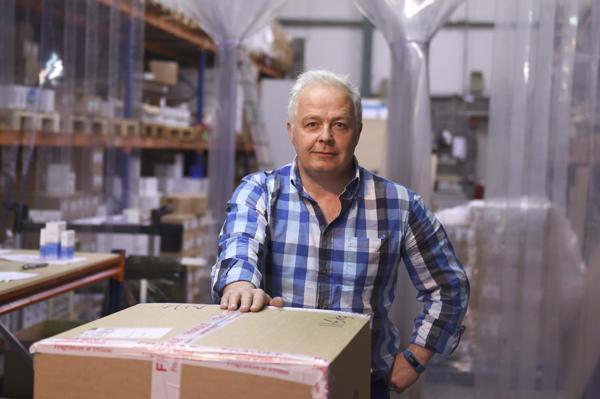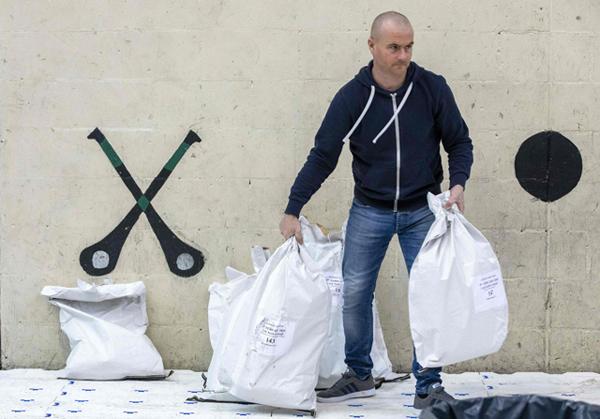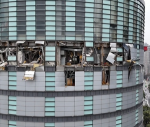You are here
Ireland's anti-immigration right eyes election gains
By AFP - Nov 24,2024 - Last updated at Nov 24,2024
DUBLIN — The Dublin office of lawyer Malachy Steenson doubles as his election campaign headquarters. Outside is an Irish tricolour and a sign reading: "Take back our nation."
Inside, Steenson summarised his platform for the November 29 vote. "We need to close the borders and stop any more migrants coming in," he told AFP.
Ireland is one of the few European Union members without any large established far-right party. But for the first time, immigration has become a frontline election issue.
Steenson, white-haired and 61, is part of an emerging group of ultra-nationalist politicians who performed well at local elections this year and now aim to gain a foothold in parliament.
Elected to Dublin City Council in June, he is running as an independent in the inner-city Dublin Central constituency that is now one of Ireland's most ethnically diverse.
Most mainstream parties have spent much of the campaign bickering over solutions to Ireland's acute housing shortage.
But for Steenson, migrants and asylum-seekers are exacerbating that crisis.
"If you import people who are going to sit around on welfare in accommodation that should be available to Irish nationals you're just creating a bigger problem," he said.
Population surge
Ireland's economy has attracted immigrants since the 1990s when eye-popping growth earned it the "Celtic Tiger" moniker.
After recession and economic slowdown from 2008, immigration surged again following the coronavirus pandemic, plugging job vacancies in booming tech, construction, and hospitality sectors, as well as healthcare.
Some 20 per cent of Ireland's 5.4-million population is now foreign-born. Official data showed a population increase fuelled by migration of around 100,000 in the year to April 2024 -- the largest since 2007.
But rapid demographic growth has heaped pressure on housing, services and infrastructure strained by lack of investment, fanning anti-migrant sentiment and hitting still largely favourable attitudes to immigration.
"Immigration is on everyone's minds," said Caroline Alwright, a fruit and vegetable stall-owner on Moore Street, a historic city-centre market which has become a multicultural meeting place for different nationalities.
"A lot of people will vote for independent candidates, they see what is going on in this country," said Alwright, 62, a veteran trader nicknamed by customers the "Queen of Moore Street".
"This street has gone downhill, the country is being robbed blind with money given to people doing nothing on welfare," she added, gesturing toward a group of Eastern European Romani.
In Kennedy's pub across the constituency several punters also murmured discontent.
"The buses are full of foreigners, I would vote for anyone saying 'Ireland is full' and promising to do something about it," said Mick Fanning, 74.
Asylum surge
Around 110,000 Ukrainians have arrived in Ireland since Russia's full-scale invasion in 2022, one of the highest numbers per head of population in the EU.
Meanwhile asylum applications have surged to record levels since 2022, with this year's figures driven by a fourfold increase in people arriving from Nigeria.
The large inflow and the housing crisis has prompted the government to stop providing accommodation to all asylum seekers last year.
That forced hundreds of single male applicants to sleep rough in tents, sparking hostile reactions from some anti-migrant locals.
Ireland has also seen a spike in arson attacks on buildings rumoured or earmarked to provide reception centres for asylum seekers.
Last year the largest riot seen in Dublin for decades was triggered by a knife attack on children by an Irish national of immigrant origin.
At the other end of the ward, students at Dublin City University were supportive of immigration.
"We are not full, that's a closed mindset," said Carla Keogh, 19, a teaching student.
"If we look into our own past, Irish people left to find help and support in other places, as humans we need to open ourselves up."
Split vote
The ultra-nationalist vote is fragmented by micro parties and independents, with few, if any, expected to make an electoral breakthrough.
Anti-immigration votes will rather channel towards moderate independents "who are more outspoken on migration" than more radical options, said political scientist Eoin O'Malley, from Dublin City University.
Most mainstream parties have also pledged to tighten up the asylum system.
The number of arrivals from Ukraine dropped this year after the government slashed allowances and accommodation benefits for newly arrived refugees.
"We were called fascists, racists, far-right, when we proposed the same things two years ago, when in fact we are none of those things," said Steenson who self-describes as a nationalist.
Related Articles
DUBLIN — With vote-counting resuming on Monday in Ireland's closely-fought general election, the Green Party and far-right candidates are am
KILMACANOGE, Ireland –– Irish perfumier David Cox is preparing for a sales drive across the sea in Britain, but fears that if the country vo
DUBLIN — Vote-counting begins on Sunday following Ireland's general election which exit polls called as a three-way tie, meaning every ballo


















